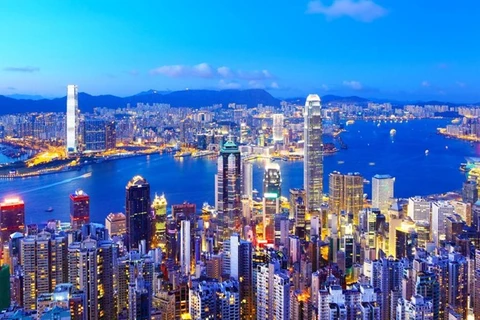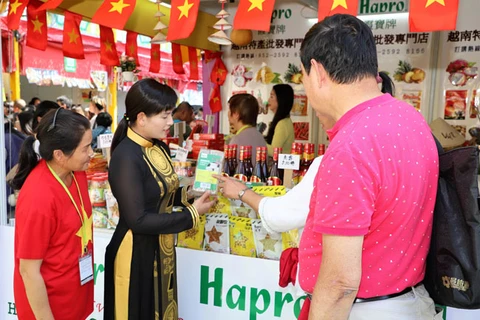 A view of Hong Kong. Banking officials of HSBC have encouraged more trade between Vietnam and Hong Kong. (Photo: instyle-hk.com)
A view of Hong Kong. Banking officials of HSBC have encouraged more trade between Vietnam and Hong Kong. (Photo: instyle-hk.com) HCM City (VNS/VNA) - Vietnam and Hong Kong should promote investment, trade and service flows between the two sides to take advantage of a diversion of trade from China amid escalating tensions between the US and China, a banking official said.
Speaking at a media briefing in Ho Chi Minh City on January 18, Terence Chiu, country head of commercial banking at HSBC Hong Kong, said that more Hong Kong investors were eyeing Vietnam as a good destination to seize huge opportunities for investment.
Some companies had started shifting production out of China to avoid tariffs imposed by the US, he said. “Vietnam is very likely to benefit from the adjusted supply chains,” he added.
“We have seen strong business flow from Hong Kong to Vietnam,” he said.
Over the past five years, trade between Vietnam and Hong Kong has seen double-digit growth.
Compared to other ASEAN member countries, Vietnam had many advantages, which have helped the country gain attention from Hong Kong businesses, he said.
Vietnam offers affordable human resources and abundant raw material sources, which are more competitive in price than other ASEAN countries.
Hong Kong investors also see high potential from Vietnam’s increasing purchasing power thanks to its growing middle class with increasing income.
Nick Mahon, head of International Subsidiary Banking for HSBC Vietnam, said: “Vietnam is seen as a possible winner in the trade war due to its low costs in manufacturing.”
“With its rapid infrastructure, economic and technological development, Vietnam has attracted attention from Hong Kong investors,” he said.
Vietnamese enterprises should try to attract more financial sources from Hong Kong to develop infrastructure and industry, while using trade transaction floors in Hong Kong to promote its goods to global buyers, he noted.
According to the Hong Kong Trade Development Council (HKTDC), in the first nine months of 2018, bilateral trade reached 18 billion USD.
Hong Kong was one of the first foreign investors in HCM City, the economic hub of the country.
As of June 2018, Hong Kong was the sixth largest foreign investor in Vietnam with total investment of nearly 19 billion USD, with Vietnam among the 25 most attractive destinations for Hong Kong businesses.
Vietnam enjoyed a trade surplus of around 3 billion USD with Hong Kong in the first half of last year, a year-on-year increase of 14.6 percent.
During the first seven months of last year, Vietnam was the sixth biggest export market in the world for Hong Kong, with total value of 6 billion USD.
As of August 2018, Hong Kong companies had more than 1,300 projects operating in Vietnam with total registered capital of 9 billion USD, focusing on key areas like textiles and garments, real estate and investments.
Vietnam continues to shine as the region’s brightest star with the strongest GDP growth.
Around 63 percent of all FDI in Vietnam is invested in the manufacturing sector.
According to the Ministry of Finance, the textile and garment sector is one of the country’s major export products, representing 12.4 percent of total export volume as of November last year.
Bilateral cooperation between Vietnam and Hong Kong has grown steadily over years, with the two signing an FTA in November 2017.
Hong Kong also signed an FTA with ASEAN that has opened the door to more cooperation opportunities for Hong Kong and Vietnam, one of the fastest growing economies in ASEAN.
Vietnam has a stable political system, a sizeable domestic market, young working population, and resilient domestic demand that can create a sound and supportive ecosystem for foreign investors.
The country ended 2018 as one of the fastest-growing Asian economies. Last year the country’s GDP accelerated to 7.08 percent year-on-year, the fastest pace since 2011.
In 2019, Vietnam will likely remain one of Asia’s fastest growing economies. The strong economic growth of the country has opened up more business opportunities.
The Comprehensive and Progressive Agreement for Trans-Pacific Partnership (CPTPP) took effect in Vietnam on January 14.
The CPTPP is expected to provide improved access to 500 million consumers among member countries, which account for 13 percent of global GDP.
The trade agreement will spur reform in Vietnam in such areas as competition, customs, e-commerce, environment, intellectual property, investment, labour standards, legal issues, and rules of origin.
By 2030, exports from CPTPP countries are expected to increase by more than 6 percent, and 8 percent in Vietnam. The trade agreement will also lead to a shift in global supply chains as trade is rerouted to CPTPP countries.
Vietnam has implemented numerous reforms to improve its business environment for foreign investors.
According to the World Bank’s Doing Business 2018 report, Vietnam ranked 68th among 190 economies, a jump of 14 against 2017 and 30 against 2012.
The country has signed many FTAs that open up investment and trade opportunities and is committed to creating a fair and attractive business environment for foreign investors.
According to a report from the Government, foreign investment in Vietnam last year increased by 9.1 percent to $19.1 billion. This was the sixth consecutive record year for foreign investment in the country.
“Strong FDI flow should improve productivity and industrial capacity, enabling the country to take advantage of trade diversion,” said Terence Chiu, country head of commercial banking at HSBC Hong Kong.-VNS/VNA
VNA























